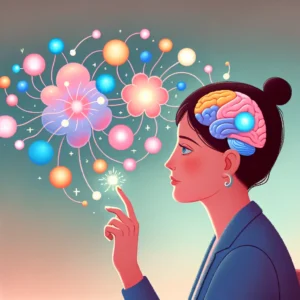Hello, relationship seekers!
Today, we’re diving deep into an important question about relationships: “How does a partner’s scent change spark jealousy in the brain’s chemical circuits?”
The Direct Answer
A partner’s scent change can indeed spark jealousy, and this reaction is rooted in our brain’s chemical circuits. The brain detects changes in a partner’s scent, which can trigger a sense of threat or insecurity, leading to feelings of jealousy. The primary catalyst behind this is the hormone oxytocin, often called the ‘bonding hormone,’ and pheromones, which are unique to every individual. However, the psychological and emotional intricacies of jealousy extend far beyond our olfactory senses and biochemical reactions.
Now, let’s explore the extensive evidence and details that support this answer:
1. The Role of Oxytocin and Pheromones in Relationship Dynamics
Oxytocin and pheromones play significant roles in relationship dynamics, especially in the context of jealousy triggered by scent changes.
A. Understanding Oxytocin and Pheromones
Oxytocin, a hormone released during physical intimacy, fosters bonding and attachment in couples. Experts like Dr. Helen Fisher, a renowned anthropologist, argue that oxytocin promotes feelings of trust and attachment, making a change in a partner’s scent a potential trigger for jealousy.
Psychological research, such as that conducted by Lundstrom and Olsson (2005), also highlights the role of pheromones. They found that individuals can subconsciously detect and react to changes in a partner’s pheromones, leading to feelings of unease or jealousy.
Real-world examples abound, such as a partner becoming suspicious or jealous when their significant other starts using a new perfume or cologne. It’s not the fragrance itself causing this reaction, but rather the alteration in the personal scent they’ve associated with their partner.
B. Oxytocin, Pheromones, and Jealousy
Historically, scent has been a critical factor in mate selection and bonding. The change in a partner’s scent can disrupt this bond and trigger jealousy.
Common challenges arise when one partner misinterprets the scent change as a sign of infidelity or disinterest. However, understanding that scent changes can naturally occur due to factors like diet, stress, or hormonal changes can help mitigate these feelings of jealousy.
Practical applications of this understanding can include open communication about changes in habits or routines that may alter one’s natural scent.
C. Overcoming Jealousy Triggered by Scent Change
Awareness of the connection between scent, oxytocin, and jealousy can empower individuals to manage their reactions. By recognizing that a change in scent isn’t necessarily indicative of a threat to the relationship, couples can better navigate feelings of jealousy.
2. The Role of the Brain’s Chemical Circuits in Jealousy
Understanding the brain’s chemical circuits can shed light on why a partner’s scent change can trigger jealousy.
A. The Amygdala and Jealousy
The amygdala, a part of the brain that processes emotions, plays a significant role in jealousy. It receives signals from the olfactory system and processes them, leading to emotional responses.
- Amygdala and Scent: The amygdala’s connection to the olfactory system makes it responsive to scent changes, potentially triggering jealousy.
- Amygdala and Emotion: The amygdala is critical in processing emotions like fear, anger, and jealousy, so a trigger like a scent change can prompt these emotional reactions.
- Amygdala and Memory: Scent is closely linked to memory. Therefore, a change in a partner’s scent can disrupt the comforting familiarity that the brain associates with that person, leading to feelings of unease and jealousy.
B. Other Brain Structures Involved in Jealousy
Other brain structures, such as the anterior cingulate cortex and the prefrontal cortex, also play roles in jealousy. They’re involved in emotional regulation, decision-making, and judgment, which can be influenced by changes in a partner’s scent.
C. Neurotransmitters and Jealousy
Neurotransmitters like dopamine and serotonin are also involved in the experience of jealousy. Changes in a partner’s scent can disrupt these neurotransmitters’ balance, leading to heightened emotional responses, including jealousy.
3. Psychological and Emotional Aspects of Jealousy
While brain chemistry and scent detection play significant roles in jealousy, it’s also crucial to consider the psychological and emotional aspects.
A. The Role of Insecurity and Fear
Insecurity and fear can amplify the impact of a partner’s scent change. A secure individual may not react as strongly to a scent change as someone with high levels of insecurity or fear of abandonment.
B. The Impact of Past Trauma
Past traumas or experiences can influence how one reacts to a partner’s scent change. For instance, someone who’s been cheated on in the past may be more sensitive to such changes.
C. Managing Jealousy
Managing jealousy involves self-awareness, communication, and trust-building. Understanding that scent changes are natural and not necessarily indicative of infidelity can help mitigate feelings of jealousy.
4. Additional Context and Considerations
While the mechanisms of scent detection, brain chemistry, and emotional factors provide insight into the link between a partner’s scent change and jealousy, several other factors can influence this dynamic.
Factors such as cultural norms, personal beliefs, individual personality traits, and relationship dynamics can all influence how a change in a partner’s scent is perceived and whether it triggers jealousy.
Conclusion: The Definitive Answer
Based on all the evidence we’ve examined:
– The Role of Oxytocin and Pheromones: Oxytocin and pheromones play significant roles in the connection between a partner’s scent change and jealousy.
– Brain Chemistry and Jealousy: The brain’s chemical circuits, particularly structures like the amygdala and neurotransmitters like dopamine and serotonin, are involved in the experience of jealousy triggered by scent changes.
– Psychological and Emotional Factors: Insecurity, fear, and past traumas can amplify the impact of a partner’s scent change on feelings of jealousy.
The definitive answer to the question “How does a partner’s scent change spark jealousy in the brain’s chemical circuits?” is that a complex interplay of hormones, brain structures, neurotransmitters, and psychological factors are involved. A change in a partner’s scent can indeed spark jealousy, but understanding the mechanisms behind this reaction can help individuals and couples navigate these feelings more effectively.
Understanding this intricate dynamic can shed light on the seemingly irrational feelings of jealousy that can arise in relationships. Being aware of these factors, and discussing them openly with your partner, can lead to a deeper understanding and healthier relationship dynamics.



